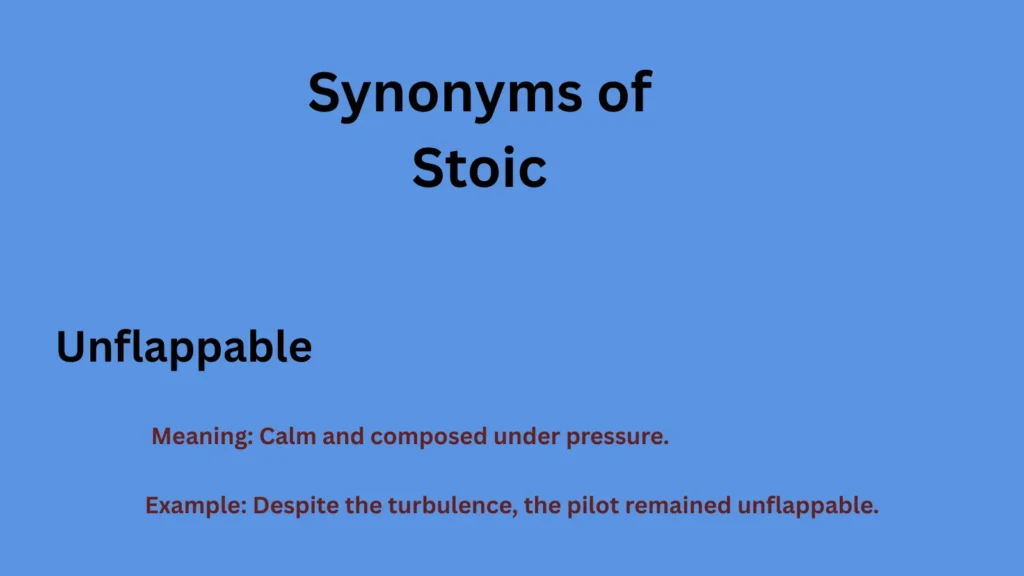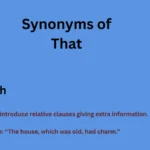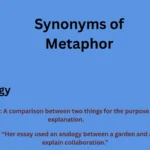Synonyms of Stoic, like unflappable, composed, and impassive, offer more nuanced ways to describe someone who remains calm and controlled under pressure. If the word “stoic” feels too general or you’re seeking alternatives that better fit emotional or situational contexts, this article has what you need.
It presents 30 carefully selected synonyms of stoic, each with a clear definition, a practical example sentence, and notes on when it’s best used—whether in storytelling, character analysis, or everyday conversation.
These Synonyms of Stoic help you express emotional restraint, quiet strength, or dignified calm with greater precision. Find the perfect term to describe inner toughness without repeating “stoic” over and over.
What Does Stoic Mean?
At its core, stoic refers to someone who endures pain, discomfort, or difficulty without showing emotion or complaint. The word has roots in ancient Greek philosophy (Stoicism), which emphasized self-control, rationality, and emotional resilience. In modern use, being stoic doesn’t necessarily mean emotionless—it suggests restraint, composure, and inner strength, especially in tough times.
Key traits include:
- Emotionally reserved
- Self-controlled
- Uncomplaining
- Composed under stress
30 Synonyms for Stoic and When to Use Them
Let’s explore 30 alternatives to stoic, along with when to reach for each one depending on tone, situation, and subtle emotional flavor.
1. Unflappable
Meaning: Calm and composed under pressure.
Use when: Someone stays cool in a chaotic or tense situation.
Example: Despite the turbulence, the pilot remained unflappable.
2. Reserved
Meaning: Restrained in expression or emotion.
Use when: Talking about someone who’s quiet or keeps their feelings private.
Example: She’s friendly but reserved with strangers.
3. Composed
Meaning: Calm and in control of emotions.
Use when: Someone appears externally calm, especially after being shaken.
Example: He delivered his speech with a composed demeanor.
4. Unemotional
Meaning: Showing little or no emotion.
Use when: You want a neutral tone about emotional detachment.
Example: Her response was surprisingly unemotional.
5. Dispassionate
Meaning: Not influenced by emotion or bias.
Use when: Talking about fairness or objectivity.
Example: A judge must remain dispassionate during a trial.
6. Detached
Meaning: Emotionally uninvolved or aloof.
Use when: Describing someone who keeps emotional distance.
Example: He seemed detached from the drama around him.
7. Impassive
Meaning: Not visibly showing emotion.
Use when: Someone masks all feelings on the surface.
Example: She kept an impassive face during the interview.
8. Serene
Meaning: Peaceful and untroubled.
Use when: You want a calm, almost spiritual tone.
Example: He looked serene as he meditated by the lake.
9. Level-headed
Meaning: Sensible and calm under stress.
Use when: Someone stays practical in crises.
Example: Her level-headed response helped de-escalate the argument.
10. Cool-headed
Meaning: Not easily upset or excited.
Use when: Emphasizing rational thinking.
Example: A cool-headed leader is vital during emergencies.
11. Indifferent
Meaning: Lacking interest or concern.
Use when: Someone appears emotionally disconnected (can sound negative).
Example: He seemed indifferent to the outcome.
12. Tranquil
Meaning: Calm and free from disturbance.
Use when: Describing a peaceful internal or external state.
Example: The monk’s mind was tranquil despite the noise.
13. Patient
Meaning: Tolerant of delay or hardship.
Use when: Emphasizing endurance over time.
Example: She waited with patient resolve.
14. Self-contained
Meaning: Emotionally independent and in control.
Use when: Someone doesn’t need external validation or emotional support.
Example: He’s self-contained and doesn’t open up easily.
15. Quiet
Meaning: Soft-spoken or emotionally low-key.
Use when: Talking about a gentle or undramatic demeanor.
Example: She had a quiet strength that inspired trust.
16. Undemonstrative
Meaning: Not openly affectionate or expressive.
Use when: Someone isn’t showy with emotions.
Example: His love was real, though he was undemonstrative.
17. Reticent
Meaning: Reluctant to share thoughts or feelings.
Use when: You want a subtle, polite tone.
Example: He was reticent about his past.
18. Austere
Meaning: Severe in manner; emotionally strict.
Use when: Describing a no-nonsense, disciplined character.
Example: Her father was austere and rarely smiled.
19. Shy
Meaning: Nervous or timid in social settings.
Use when: The emotional reserve stems from social anxiety.
Example: He was too shy to speak up in the meeting.
20. Modest
Meaning: Humble or unassuming.
Use when: Highlighting restraint in expression, especially success.
Example: She remained modest despite her achievements.
21. Muted
Meaning: Softened or subdued.
Use when: Describing emotions or reactions that are restrained.
Example: His excitement was muted but genuine.
22. Emotionless
Meaning: Lacking visible emotion.
Use when: Describing an extreme or unsettling calm.
Example: His face was emotionless during the verdict.
23. Grim
Meaning: Firm and serious, often in bleak situations.
Use when: A stoic attitude has an edge of determination.
Example: He gave a grim nod and marched forward.
24. Tough
Meaning: Emotionally or physically strong.
Use when: Highlighting resilience.
Example: She’s tough—she’s been through worse.
25. Unyielding
Meaning: Not giving in to pressure.
Use when: Emphasizing inner strength.
Example: He remained unyielding in the face of criticism.
26. Disciplined
Meaning: Controlled and rule-following.
Use when: Someone exhibits restraint through habit or training.
Example: A disciplined mind is key to success.
27. Flat
Meaning: Emotionally dull or expressionless.
Use when: Intentionally minimal expression (often used negatively).
Example: Her tone was flat and unreadable.
28. Unshakeable
Meaning: Unable to be disturbed or moved emotionally.
Use when: Someone is resilient to emotional upheaval.
Example: His faith in her was unshakeable.
29. Collected
Meaning: In full control of one’s thoughts and actions.
Use when: Someone is outwardly calm and steady.
Example: She remained collected during the fire drill.
30. Closemouthed
Meaning: Reluctant to talk, especially about emotions.
Use when: Someone is intentionally private.
Example: He was closemouthed about the breakup.
Choosing the Right Synonym: A Quick Guide
Choosing the best synonym for stoic depends on context, emotional tone, and the impression you want to create:
| Scenario | Best Options |
| Calm in crisis | Unflappable, cool-headed, composed |
| Quiet strength | Reserved, self-contained, modest |
| Emotionally distant | Detached, impassive, unemotional |
| Peaceful or serene | Tranquil, serene, composed |
| Formal or authoritative tone | Dispassionate, austere, unyielding |
| Negative or cold connotation | Emotionless, flat, indifferent |
| Social awkwardness or timidity | Shy, reticent, closemouthed |
Conclusion:
Stoic and its many synonyms allow writers to express shades of emotional control, strength, and reserve. Whether you’re describing a brave leader, a quiet introvert, or someone who’s shut off emotionally, the word you choose shapes your reader’s perception.
Start by asking: Is the person calmly strong or emotionally distant? Quietly humble or coldly detached? Then match your word to the tone you want.
Expanding your vocabulary doesn’t just make your writing more precise—it helps you understand people and characters more deeply. So next time you reach for “stoic,” pause and ask if one of these 30 alternatives might say it even better.


